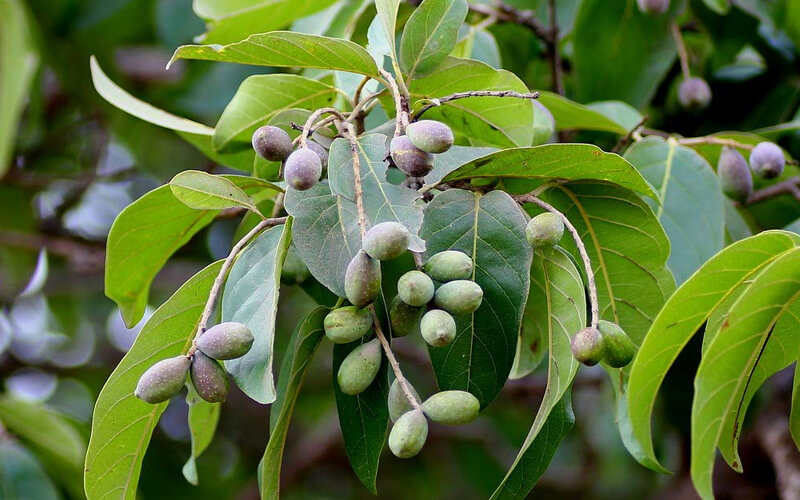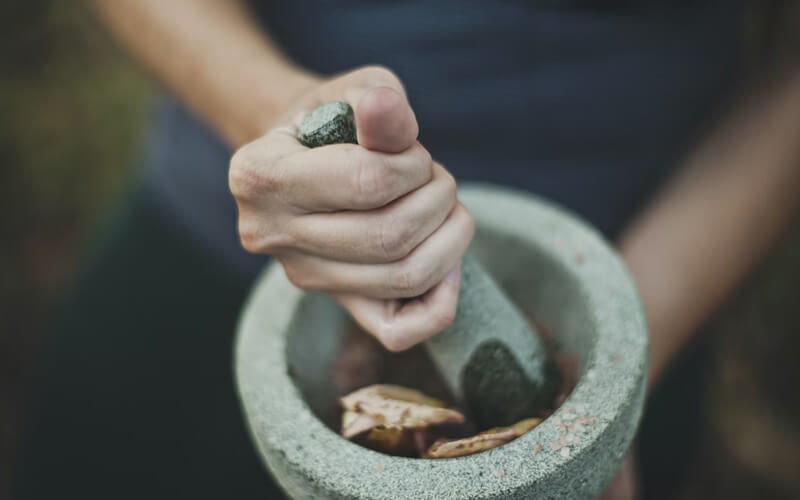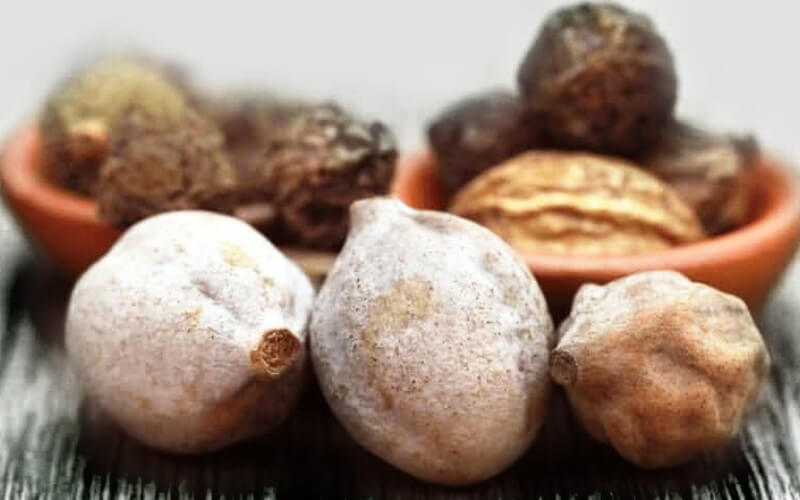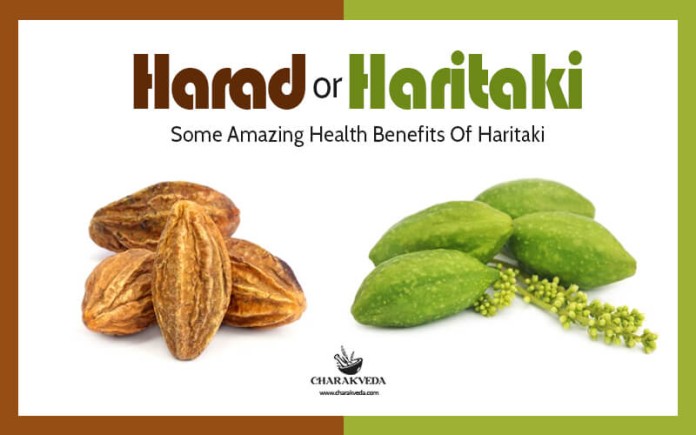Harad Or Haritaki is called the ‘Kind of Medicines’ and is always listed as number one in Ayurveda as it has held high esteem in Ayurveda for its properties to prevent and cure diseases and because of its extraordinary therapeutic benefits. Since ancient times it has enjoyed the prime place among medicinal herbs in India.
Seven varieties of haritaki fruits are described in Ayurveda namely, Vijaya, Rohini, Putana, Amrita, Abhaya, Hivanti, and Chetaki.
Ancient scholars have also described its varieties among its sources, therapeutic uses, and identity features. Many scholars have studied the pharmacological screening of the drug but however only one has tried to correlate the variety of the plants in the context of Tibetan medical science and Ayurveda and he is Vaidya Bhagawan Dash. Hence, a comprehensive study of discovering and collecting data on the variety of haritaki is mentioned in Ayurvedic as well as in other literature also carried out for botanical standardization.
Different Ways To Take Haritaki In Different Seasons:

Haritaki is mostly available in powdered form and it has to be taken by infusing in warm water or in the form of a decoction or tea. Take this powder in a specific way that has mentioned below to reap its benefits.
Summer Season : In this season it can be taken along with jaggery.
Early Winter Season : In this season it is consumed with ginger and in the late winters you can take it alongside long pepper.
Autumn Season : To reap its benefits in the autumn season consume it with natural or flavored honey.
Health Benefits of Haritaki

Read Also: Triphala Churna Benefits And Its Healing Properties
Help promote digestion : Hiratki is enormously beneficial for improving the digestive functions of the body by increasing the absorption of essential nutrients from the food being a potent digestive. The powdered form of this fruit has a mild laxative effect on the body that treats constipation by decreasing flatulence, removing waste products from the body, and cleansing the intestines. To reduce stomach acidity and minimalize the chances of various stomach ulcers this is extremely effective.
Weight loss : The herb included in the daily diet not only improves digestion but also plays a key role in reducing obesity. It detoxifies the body effectively by removing AMA toxins and reduces the sudden hunger pangs and the craving for healthy dietary choices. A glass of warm water infused with haritaki powder with honey will shed away the fat deposits and also energize the body and promote longevity.
Diabetes management : Scientific researchers have strongly advocated the use of haritaki for managing diabetes, keeping blood sugar levels under control. It helps in reducing the breakdown of starch into glucose which regulates the secretion of insulin that also leads to low blood glucose levels.
Oral hygiene improvement : Haritaki is used as a mouthwash traditionally to treat and cure various problems related to oral hygiene like oral sores, mouth ulcers, gum disease. The anti-bacterial nature of the herb makes it highly significant in alleviating the bacterial invasion from the oral cavities which thereby prevents cavities and tooth decay.
Healthy for Skin and Hair : The most interesting antibacterial and antioxidant nature of this herb is to promote overall skin and hair health. It is advised strongly for various skin infections like pimples, rashes, acne, boils, and more. It also helps in treating the scalp infections like itching, hair fall, and dandruff. If we apply the past of haritaki to the affected area then it can speed up wound healing and cure pimples and acne. It can also prevent further breakouts.
Effectiveness on Doshas : This herb is miraculous and it balances all three doshas which its Vata (The Air), Pitta (Digestion), and Kapha (That is earth and water).
Helps for Arthritis : Harad or Haritaki helps in managing the pain of joints and enhances the longevity of muscles, tissues, and bones due to the balancing property of Vata. Take harad with ghee for the balancing effect of Vata.
Disease like Alzheimer’s : Harad has the property of giving strength to the nervous system which helps in controlling its related disorders due to the Rasayana (rejuvenating) and Vata balancing properties.
Cold and cough : Due to its Kapha balancing property harad is good for preventing cough and cold naturally. An advice to take harad with salt will help in balancing Kapha.
Improvement in heart condition : The muscles grow stronger as the purity of the blood increases. Cleaning of blood happens with the help of Haritaki that effect stops the build-up of fat in the artery, especially the coronary artery. When all these effects take place it leads to a reduction in blood pressure, clear arteries, and a strong heart.
Dosage to be taken of Harad
- Capsule of Harad : It has to be taken 1-2 capsules twice a day.
- Tablet of Harad : It is taken twice a day – 1 or 2 tablets.
- Churna of Harad: ¼ to ½ teaspoon of harad churna is taken twice a day.
Read Also: Health Benefits Of Chyawanprash And Ayurvedic Supplement
Different Types of Harad

In market place harad is available in many forms. Other than the versatile and popular powdered form, a haritaki paste and a jam-like preparation made with ghee or sugar syrup is also available.
Haritaki may also be prescribed in tablet form or as an herbal oil depending on the ailment. Based on the individual’s needs different forms are prescribed.
- The most commonly available form of haritaki is powder or churna.
- Haritaki powder is mixed with water, ghee, or other herbs which is in paste or legiyam form.
- Oils can be infused with haritaki to use on the skin, hair, nails, and in food.
- Tablets are the modern form of haritaki designed for busy consumers who are used to getting their medicines in pill form.
Different Varieties of Haritaki

Read Also: Baheda Powder Benefits And Other Important Details
Chetaki Haritaki : This three layered skin of the fruit is used for purgation and is mostly found in the regions of Himachal.
Vijaya Haritaki : It is found in the Vindhya mountain ranges and is used for curing ailments.
Rohini Haritaki : These are widely grown in the Sindh regions and the fruit is round in shape and is mostly used for wound healing and as a remedy to fight against the effects of consuming harmful substances.
Putna Haritaki : This fruit is small with big seeds and is mostly used only for external applications and is found in the region of Himalayas.
Jayanti Haritaki : This haritaki is mostly found in the Saurashtra region of Gujarat. The tree bears flowers of yellow color and the dried fruits are used for curing all types of disorders.
Abhaya Haritaki : It is a five layered fruit skin that is used for treating vision problems and is cultivated in the Chhattisgarh regions of Champa.
Amrita Haritaki : This variety of harritaku has a thick fruit pulp that contains panchakarma properties and is found in the regions of Champa Bhagalpur.
Harad in Regional Languages
“Harad” is said in Urdu and Hindi, in Tamil it is “Kadukkai”, in Marathi it is “Hirada”, in Assamese it is “Hilikha” and “Horitoky” in Bengali.
Side Effects of Harad

Though it is believed that Harad claims to cure most of the disorders it also does come with certain side effects which must be kept in mind.
- There is a possibility of slowing down the blood-cloth formation process.
- Women who are pregnant and lactated must abstain from consuming Harad. It is because there is no foolproof evidence of hard to be safe in pregnancy so it’s better to avoid it.
- If high consumption of the herb is taken that it might not solve your digestive issues instead enhance them. Consuming the Harad more than it is required can lead to bloating and diarrhea.
- Harad has the ability to lower the blood sugar level in the body which is positive for diabetic patients but care must be taken not to consume it with prescribed medication and take the doctor’s opinion in this case. Also, avoid consuming it at least two weeks before any kind of surgery.


